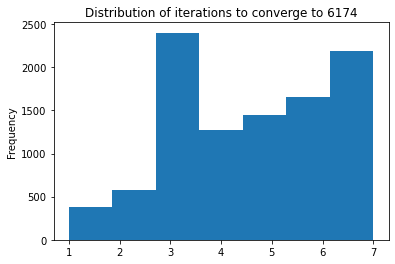6174 - doesn't seem like a very interesting number at first glance but this Numberphile video shows that all four digit numbers converge to this number if the following procedure is followed:
- Start with a four digit number. (All four digits cannot be the same).
- Sort the digits in descending order -> D
- Sort the digits in ascending order -> A
- Take the difference between D and A.
- Repeat steps 1-4 with the new number -> D-A.
The answer will always converge to 6174!
I wrote a little function in python to test this out:
def difference(numbers: list, verbose=True):
if verbose: print(f"Calling function with {numbers}")
# numbers = [int(i) for i in str(number)]
desc = int(''.join([str(i) for i in sorted(numbers, reverse=True)]))
asc = int(''.join([str(i) for i in sorted(numbers)]))
diff = desc - asc
if verbose: print(f'{desc}-{asc} = {diff}\n')
if diff == 0:
if verbose:
print("Did not converge! All digits in the number are the same!")
return False
elif diff == 6174:
if verbose: print("Converged!")
return 1
else:
count = difference([int(i) for i in str(diff)], verbose)
if count:
count += 1
else:
count = False
return countExample
Let's look at an example using the numbers 3 2 4 5.
difference([3,2,4,5])Output:
Calling function with [3, 2, 4, 5]
5432-2345 = 3087
Calling function with [3, 0, 8, 7]
8730-378 = 8352
Calling function with [8, 3, 5, 2]
8532-2358 = 6174
Calling function with [6, 1, 7, 4]
7641-1467 = 6174
Converged!
3In this case it took 3 iterations to converge to 6174.
Test for all four digit numbers.
I had to check for myself if this claim held for all four digit numbers, so I used the itertools module to test it:
from itertools import product
non_converging = []
counts = []
n_attempts = 0
n_success = 0
numbs_attempted = []
for numbers in list(product(range(10), repeat=4)):
# All numbers cannot be the same, differnece is 0!
if len(set(numbers)) > 1:
n_attempts += 1
try:
count = difference(list(numbers), verbose=False)
if count:
counts.append(count)
n_success += 1
numbs_attempted.append(numbers)
else:
non_converging.append(numbers)
except RecursionError:
non_converging.append(numbers)
print(f"Total numbers attempted: {n_attempts}")
print(f"Successfully converged = {n_success}")
print(f"Non converging: {len(non_converging)}")
print(non_converging)
print(f"Maximum iterations to converge: {max(counts)}")Output:
Total numbers attempted: 9990
Successfully converged = 9918
Non converging: 72
[(0, 0, 0, 1), (0, 0, 1, 0), (0, 1, 0, 0), (0, 1, 1, 1), (1, 0, 0, 0), (1, 0, 1, 1), (1, 1, 0, 1), (1, 1, 1, 0), (1, 1, 1, 2), (1, 1, 2, 1), (1, 2, 1, 1), (1, 2, 2, 2), (2, 1, 1, 1), (2, 1, 2, 2), (2, 2, 1, 2), (2, 2, 2, 1), (2, 2, 2, 3), (2, 2, 3, 2), (2, 3, 2, 2), (2, 3, 3, 3), (3, 2, 2, 2), (3, 2, 3, 3), (3, 3, 2, 3), (3, 3, 3, 2), (3, 3, 3, 4), (3, 3, 4, 3), (3, 4, 3, 3), (3, 4, 4, 4), (4, 3, 3, 3), (4, 3, 4, 4), (4, 4, 3, 4), (4, 4, 4, 3), (4, 4, 4, 5), (4, 4, 5, 4), (4, 5, 4, 4), (4, 5, 5, 5), (5, 4, 4, 4), (5, 4, 5, 5), (5, 5, 4, 5), (5, 5, 5, 4), (5, 5, 5, 6), (5, 5, 6, 5), (5, 6, 5, 5), (5, 6, 6, 6), (6, 5, 5, 5), (6, 5, 6, 6), (6, 6, 5, 6), (6, 6, 6, 5), (6, 6, 6, 7), (6, 6, 7, 6), (6, 7, 6, 6), (6, 7, 7, 7), (7, 6, 6, 6), (7, 6, 7, 7), (7, 7, 6, 7), (7, 7, 7, 6), (7, 7, 7, 8), (7, 7, 8, 7), (7, 8, 7, 7), (7, 8, 8, 8), (8, 7, 7, 7), (8, 7, 8, 8), (8, 8, 7, 8), (8, 8, 8, 7), (8, 8, 8, 9), (8, 8, 9, 8), (8, 9, 8, 8), (8, 9, 9, 9), (9, 8, 8, 8), (9, 8, 9, 9), (9, 9, 8, 9), (9, 9, 9, 8)]
Maximum iterations to converge: 7
It works for except for 9918 out of 9990 combinations of four digits where all digits are not the same. The instances where it doesn't converge to 6174 are when 3 of the digits are the same number and the remaining digit is +/- 1 of the same number. In this cases the result from the first iteration is 999, the next one results in 0 and then the procedure cannot continue anymore.
The plot below shows the distribution of the number of iterations it takes to converge to 6174. The mode is 3 iterations and the mean 4.67.

Full code can be found on GitHub .
